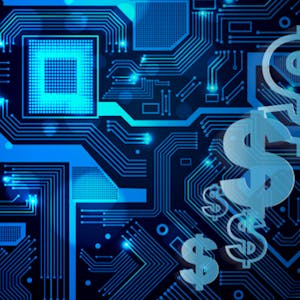The Economics of AI course, offered by the University of Virginia, provides an in-depth exploration of the implications of advanced artificial intelligence on the economy and society. Through cutting-edge research, the course covers the intersection of AI and economics, including the implications for economic growth and labor markets.
Throughout the course, you'll delve into the nature of intelligence and information theory, modeling technological progress, the impact of AI on economic growth, labor markets and inequality, economic policies in the age of AI, and the potential disruptions and challenges posed by highly intelligent AI algorithms.
By examining these critical topics, you'll gain a comprehensive understanding of how advanced artificial intelligence will affect our economy and society, equipping you with valuable insights for navigating the evolving landscape of AI and its economic implications.
Certificate Available ✔
Get Started / More Info
The course modules cover a wide range of topics, including the nature of intelligence, modeling technological progress, AI and economic growth, labor markets and inequality, economic policy in the age of AI, and the economics of transformative AI.
The course begins with an exploration of intelligence and information theory, delving into the nature of intelligence, examples of intelligent entities, and the evolution of intelligence. It also covers the history of AI and recent advances in the field.
This module focuses on modeling technological progress, including the production process, properties of production functions, the bias of technological change, labor-saving progress, and the economic effects of digital innovation.
AI and Economic Growth module explores growth models, such as the Malthusian model and the Solow model, and their implications for AI-driven economic growth. It also covers the potential for a growth singularity and the impact of AI on knowledge accumulation.
Examining labor markets and inequality, this module delves into the history of technology and labor, neoclassical labor market equilibrium, skill-biased and routine-replacing technological change, and the impact on individual job displacement and meaning in work.
This module addresses economic policy in the age of AI, discussing the implications of technological progress on welfare, income distribution, taxation, and the management of the transition to less work. It also explores economic policy examples and the role of competition and information policy.
The Economics of Transformative AI module covers a broader model of economic agents, the long-run viability of humans in the economy with AI agents, and the challenges and strategies for controlling highly intelligent AI algorithms.
This Specialization equips learners with economic tools to analyze global events, understand the impact of policies, and make informed business and investment decisions....
Earth Economics offers a comprehensive understanding of global economic policy. By focusing on sustainability, equality, and empirical analysis, the course equips...
Les alliances qui changent les territoires explores the collaboration between public, private, and non-profit actors for the common good of a territory.
Crisis Communications equips professionals with essential skills to effectively handle crisis situations through strategic communication and media interviews.